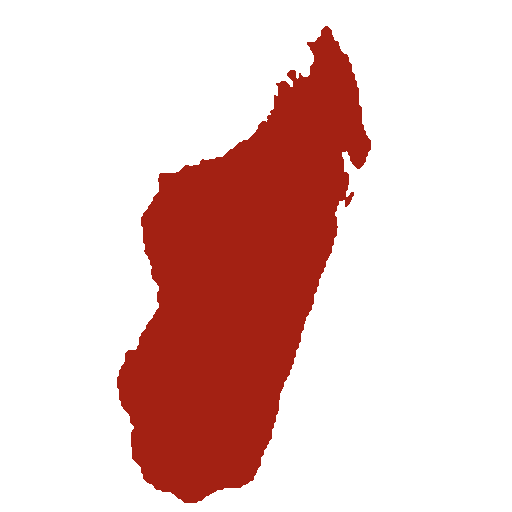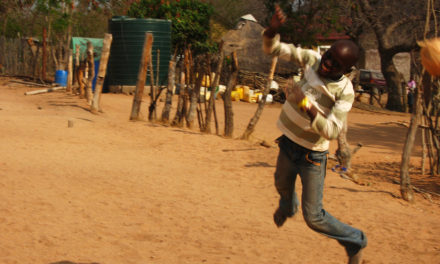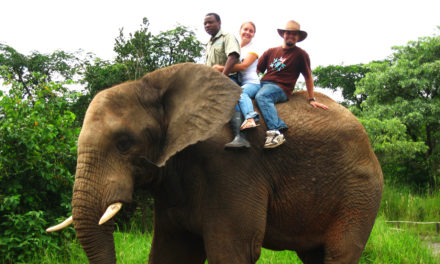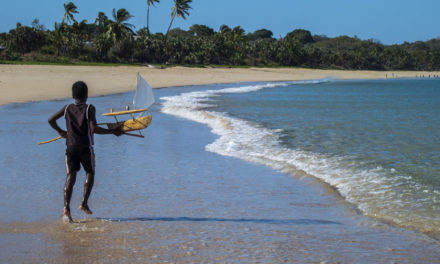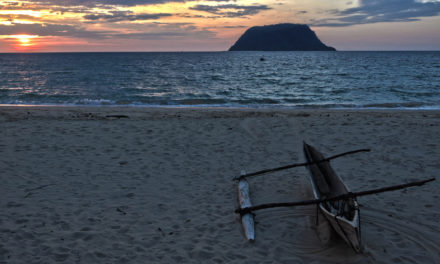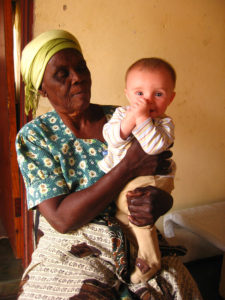
Here’s Matimu with his “great-grandmother” in Dumphries. Her name is Asah and she’s one of the grandmothers from our host family in South Africa, which makes Matimu her “great-grandson!” I think she enjoyed him as much as our blood family in America.
We stepped off the taxi, three of us this time, back in our village in South Africa. We began walking down the dusty road, towards the small house where the new Peace Corps Volunteers are staying in Dumphries. We saw a couple of girls a ways off and they looked in our direction. Immediately they started shouting “Matimu!” and pointed excitedly. In the ¼ mile it took to get where we were going, Matimu was recognized (and acknowledged through shouting and pointing) several times. And it was the first time our four-month old baby had ever been seen there!
Arriving back in Dumphries, our village in South Africa where we lived for over two years as Peace Corps Volunteers, was a real treat for us. We had an extended stopover in South Africa, on our way to Madagascar. Everyone was thrilled to see us after our 11-month absence. There were more than a few arguments about which side of the village we should’ve been staying in while we were there. One of our schools held an impromptu staff meeting and school-wide assembly just to greet us and catch up on life (as well as pledge to come visit us in Madagascar next year). I was requested to lead a special Art Club project during our time there. Some kids even walked about five miles to our side of the village just to spend a few hours of our short visit with us. It felt like we never left.
But what was coolest of all, in my opinion, was how almost everyone who knew us also knew our newborn baby, Matimu. It’s true that we sent an e-mail to the principals and teachers at both of the schools we worked in, announcing Matimu’s birth and attaching a few photos. But they’d only been using e-mail at all for less than a year, and anyway, we were on the other side of the world at the time. But apparently, the word spread pretty fast, many copies of Matimu’s photos were printed and distributed (in many unexpected places), and Matimu’s arrival in Dumphries was eagerly expected! Most people knew him by name and many remarked on how much he’d grown since the photos they saw.
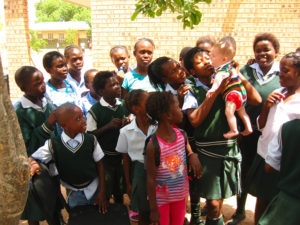
Matimu is a hit everywhere we go. Here you can see him with a lot of the schoolchildren from our school Mahlahluvana in Dumphries, South Africa. Most days he was quite worn out from the attention though!
In about two years in Dumphries, South Africa, we really became a part of local life, even an important part, certainly a memorable part. Many people there even remembered to ask how my dad was doing, since last they’d heard he was diagnosed and being treated for cancer. They’d been praying for him. Our friends and “family” in South Africa not only accepted us as part of their lives, but they also did it in their own manner, extending the acceptance beyond us even to our families back in America, as an important part of their lives. There’s a wonderful sort of community there.
Coming back to South Africa and to Dumphries was easy, and it was incredibly enjoyable. But arriving in South Africa and Dumprhies for the first time over three years ago wasn’t like that at all. Sure, it was new and exciting, but it was challenging and incredibly stressful. Everything was different, and often not in a good way. We had no idea what to expect and so we expected all the wrong things. We got angry at people, people got angry at us. We often thought we knew what we were saying to people, only to find out that no one listening had a clue what we were attempting, or that we twisted the words through mispronunciation and turned something meaningful into an awful joke! In our first year and more in South Africa, life was FULL of up’s and down’s.
But it evened out. After all that struggling, eventually we became comfortable there, both with the way of life and with conversations in the local language, Shangaan. People became comfortable with us. Life in Dumprhies, South Africa, became our life. And our lives became an integral part of the local village and school communities. Not just our work (which was beginning to be successful), but us. Before two years had passed, we were at home. Not back home in America, but at home in South Africa.
So returning to South Africa after almost a year back in the United States was like getting all of the good parts of that experience and none of the bad and stressful parts. We had already arrived. We knew what life was like. We knew the people. Our contributions to life there from our time as Peace Corps Volunteers are widely acknowledged and appreciated. The only thing new was Matimu and he was probably the most exciting part for everyone. People showered him with more gifts. Our short visit back in South Africa was not only very restful, it was also very edifying. It was a time to appreciate what we’ve come through in order to get where we are.
But now we’re past that point and, in a way, back at the beginning again. We’re starting a new life, and a much longer one, in Madagascar. Here, everything is once again new. In many ways, it’s nothing like South Africa. Not that we particularly expected it to be. The language is entirely different. Almost no one speaks any English at all. In some places, many speak French, which is a language I already know fairly well (but is unknown to Lora), but just as often, or more so, they speak no French at all and my skills in that language become worthless.
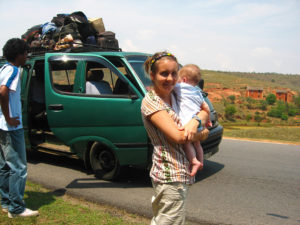
In Madagascar, we’re continuing to take public transport. On our way from the capital city (where we arrived by plane) to Antsirabe (where we’ll be living for 6-7 months of language training), our taxi-brousse broke down. Just an average detail of life here. 🙂
The weather is very different. The foods are different. Methods of transport are different. The currency is different and is used interchangeably with French numbers and Malagasy numbers depending on the person, although with the latter the amount is divided by five – if that gives you any idea of the complexity of just trying to figure out how much a cup of rice costs! And this is the most substantial part: the people are different.
Because while the food and money and clothes and transport and housing and all of that are some of the first and biggest changes that new arrivals like us notice, they’re not the most significant in the long run. It only takes a few months to a year for most people to adjust to those more obvious outward changes. Whether foreigners like the changes or not, they learn to generally know what to expect.
But people in other countries are usually different to the core: their beliefs and values, their perspectives on life and where they find meaning in it, and their motivations for decision-making. Depending on history and proximity we may share one or several major attributes with them. But in an isolated island nation on the opposite side of the world like Madagascar, similarities in worldview are much harder to find and in most respects simply don’t exist. THIS, above anything else, is the big challenge ahead of us.
It’s nice to know that we met that challenge and succeeded once already, in South Africa. But South Africa is the hub of southern Africa, and for that reason, the most heavily Westernized already; the part of Africa most like us. Even in our rural village there, the changes that the Western world brings were inescapable and often easily recognizable. Madagascar, isolated as it is, isn’t nearly in the same position, especially not its rural areas, which are the majority of the country and which will be the focus of our work over the years here. We’ve made that adaptation to a new people and place once already, but on a smaller level. This is the big, and likely lifelong, challenge ahead of us now, here in Madagascar.
And we’ve already begun to meet it. As soon as we stepped foot here, the process began. More than that, it began in a distant, more abstract way, over our years of study of Malagasy culture and history. We’re now negotiating the government establishments as we try to get our visas extended already. We’re doing our Malagasy language study for the next six months in a nice town not far from the capital city, called Antsirabe. We’re meeting people and learning how to get around the town. We’re figuring out where the markets are, how to bargain, and how to understand just which set of numbers they’re using to refer to the price.
Our Malagasy language lessons have been happening for only a few days now, but they’re going great. We think we’re blessed to have the best language teacher and teaching methods that either of us have ever experienced. Already we can comprehend some complex sentences and almost 100 words. That much, though, is barely the beginning.
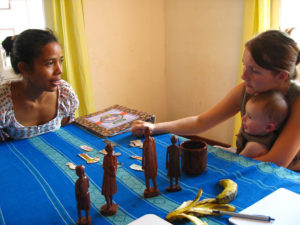
During our first day of language training at our home in Antsirabe. Our teacher is excellent and uses an excellent method of teaching. In three days we can already understand well over 100 words, and in complex sentences too.
This time of language learning is so important for us as the beginning of our lives and work here. Until we can speak regularly and in their own language with the local people, we can hardly assume that we have any idea what’s going on in their lives, their thoughts, their beliefs, and their very conceptions of the world. And without knowing those things of the Malagasy people, or at least approaching an understanding of those things, how can we possibly succeed in the work of bringing the Good News and the Kingdom of God to the very core of their lives and their being? To meet that big challenge of understanding the many ways that Malagasy people see the world will take years at least, and we should continue improving for years after that. But the first big step is to know how to talk.
Since we’ve last written, we’ve gone back to South Africa, and now forth to Madagascar. The contrast of our position and our comfortability in both places is huge. But I think life is full of those backs and forths. Maybe more “forths” than “backs”, but both have their place.
I think God gives us those times of going back, of resting in our success and accomplishments, our arrivals, as a sort of Sabbath. In all our lives, God is pushing us onward, drawing us higher, remaking us more into the image we were made to be from the start. And all of that pushing, drawing, and remaking can often be exhausting to us. So oftentimes God gives us the chance (or at least wants us to take the opportunity!) to go back and see what he’s done in our lives. Sometimes the going forward should wait a day, or a week, or a month. And in that waiting it’s good to be in a place where things have happened, where we can see what God has already done and accomplished in and through and with us.
Our few weeks in South Africa was that time for us. It was restful, rewarding, rejuvenating, and everything it could have been. But there’s always a time to move forward again. After all, we all still have so far to go! Maybe only one day in seven goes towards that time of rest and reflection, but when God offers it to you, take it! There’s always more ahead, and better to be rested and ready for it than tired and worn out. Even with so far and so much still to go, it’s wonderful to look back and see how far God has brought us already. Certainly it gives us a better perspective when we look forward again and we can only speculate at what wonders he still has in store. Praise him!
